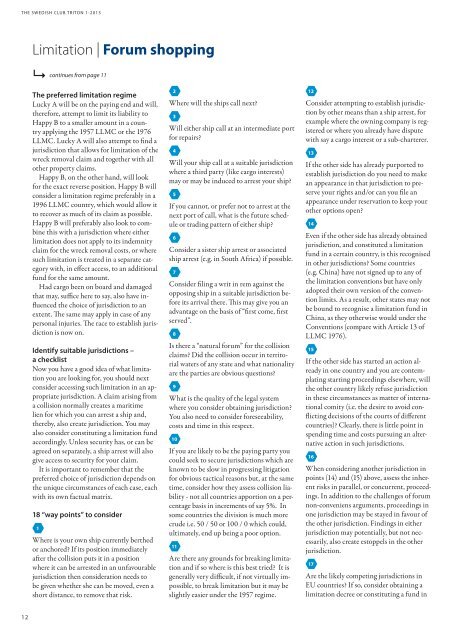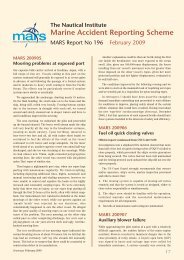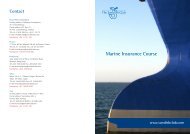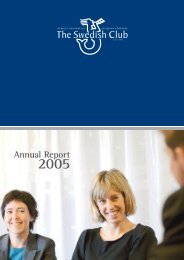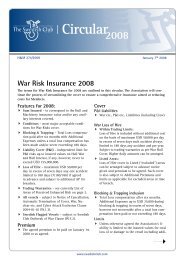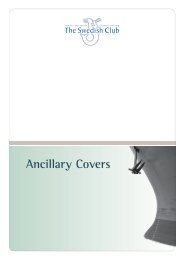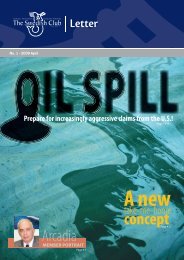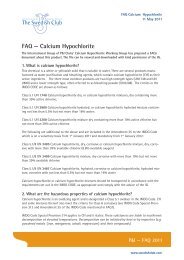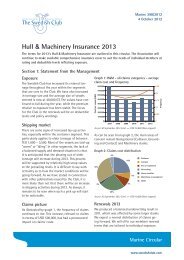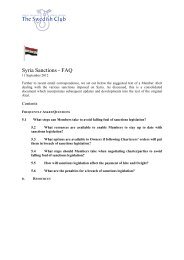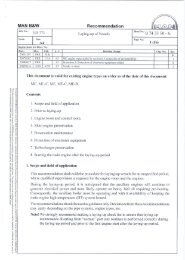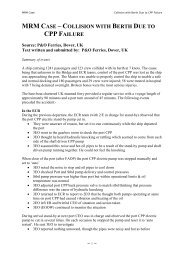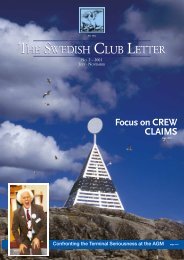TSC Triton no 1-2013 - The Swedish Club
TSC Triton no 1-2013 - The Swedish Club
TSC Triton no 1-2013 - The Swedish Club
- No tags were found...
You also want an ePaper? Increase the reach of your titles
YUMPU automatically turns print PDFs into web optimized ePapers that Google loves.
THE SWEDISH CLUB TRITON 1-<strong>2013</strong>Limitation | Forum shopping9continuesfrom page 11<strong>The</strong> preferred limitation regimeLucky A will be on the paying end and will,therefore, attempt to limit its liability toHappy B to a smaller amount in a countryapplying the 1957 LLMC or the 1976LLMC. Lucky A will also attempt to find ajurisdiction that allows for limitation of thewreck removal claim and together with allother property claims.Happy B, on the other hand, will lookfor the exact reverse position. Happy B willconsider a limitation regime preferably in a1996 LLMC country, which would allow itto recover as much of its claim as possible.Happy B will preferably also look to combinethis with a jurisdiction where eitherlimitation does <strong>no</strong>t apply to its indemnityclaim for the wreck removal costs, or wheresuch limitation is treated in a separate categorywith, in effect access, to an additionalfund for the same amount.Had cargo been on board and damagedthat may, suffice here to say, also have influencedthe choice of jurisdiction to anextent. <strong>The</strong> same may apply in case of anypersonal injuries. <strong>The</strong> race to establish jurisdictionis <strong>no</strong>w on.Identify suitable jurisdictions –a checklistNow you have a good idea of what limitationyou are looking for, you should nextconsider accessing such limitation in an appropriatejurisdiction. A claim arising froma collision <strong>no</strong>rmally creates a maritimelien for which you can arrest a ship and,thereby, also create jurisdiction. You mayalso consider constituting a limitation fundaccordingly. Unless security has, or can beagreed on separately, a ship arrest will alsogive access to security for your claim.It is important to remember that thepreferred choice of jurisdiction depends onthe unique circumstances of each case, eachwith its own factual matrix.18 “way points” to consider1Where is your own ship currently berthedor anchored? If its position immediatelyafter the collision puts it in a positionwhere it can be arrested in an unfavourablejurisdiction then consideration needs tobe given whether she can be moved, even ashort distance, to remove that risk.2Where will the ships call next?3Will either ship call at an intermediate portfor repairs?4Will your ship call at a suitable jurisdictionwhere a third party (like cargo interests)may or may be induced to arrest your ship?5If you can<strong>no</strong>t, or prefer <strong>no</strong>t to arrest at thenext port of call, what is the future scheduleor trading pattern of either ship?6Consider a sister ship arrest or associatedship arrest (e.g. in South Africa) if possible.7Consider filing a writ in rem against theopposing ship in a suitable jurisdiction beforeits arrival there. This may give you anadvantage on the basis of “first come, firstserved”.8Is there a “natural forum” for the collisionclaims? Did the collision occur in territorialwaters of any state and what nationalityare the parties are obvious questions?9What is the quality of the legal systemwhere you consider obtaining jurisdiction?You also need to consider foreseeability,costs and time in this respect.10If you are likely to be the paying party youcould seek to secure jurisdictions which arek<strong>no</strong>wn to be slow in progressing litigationfor obvious tactical reasons but, at the sametime, consider how they assess collision liability- <strong>no</strong>t all countries apportion on a percentagebasis in increments of say 5%. Insome countries the division is much morecrude i.e. 50 / 50 or 100 / 0 which could,ultimately, end up being a poor option.11Are there any grounds for breaking limitationand if so where is this best tried? It isgenerally very difficult, if <strong>no</strong>t virtually impossible,to break limitation but it may beslightly easier under the 1957 regime.12Consider attempting to establish jurisdictionby other means than a ship arrest, forexample where the owning company is registeredor where you already have disputewith say a cargo interest or a sub-charterer.13If the other side has already purported toestablish jurisdiction do you need to makean appearance in that jurisdiction to preserveyour rights and/or can you file anappearance under reservation to keep yourother options open?14Even if the other side has already obtainedjurisdiction, and constituted a limitationfund in a certain country, is this recognisedin other jurisdictions? Some countries(e.g. China) have <strong>no</strong>t signed up to any ofthe limitation conventions but have onlyadopted their own version of the conventionlimits. As a result, other states may <strong>no</strong>tbe bound to recognise a limitation fund inChina, as they otherwise would under theConventions (compare with Article 13 ofLLMC 1976).15If the other side has started an action alreadyin one country and you are contemplatingstarting proceedings elsewhere, willthe other country likely refuse jurisdictionin these circumstances as matter of internationalcomity (i.e. the desire to avoid conflictingdecisions of the courts of differentcountries)? Clearly, there is little point inspending time and costs pursuing an alternativeaction in such jurisdictions.16When considering a<strong>no</strong>ther jurisdiction inpoints (14) and (15) above, assess the inherentrisks in parallel, or concurrent, proceedings.In addition to the challenges of forum<strong>no</strong>n-conveniens arguments, proceedings i<strong>no</strong>ne jurisdiction may be stayed in favour ofthe other jurisdiction. Findings in eitherjurisdiction may potentially, but <strong>no</strong>t necessarily,also create estoppels in the otherjurisdiction.17Are the likely competing jurisdictions inEU countries? If so, consider obtaining alimitation decree or constituting a fund in12


